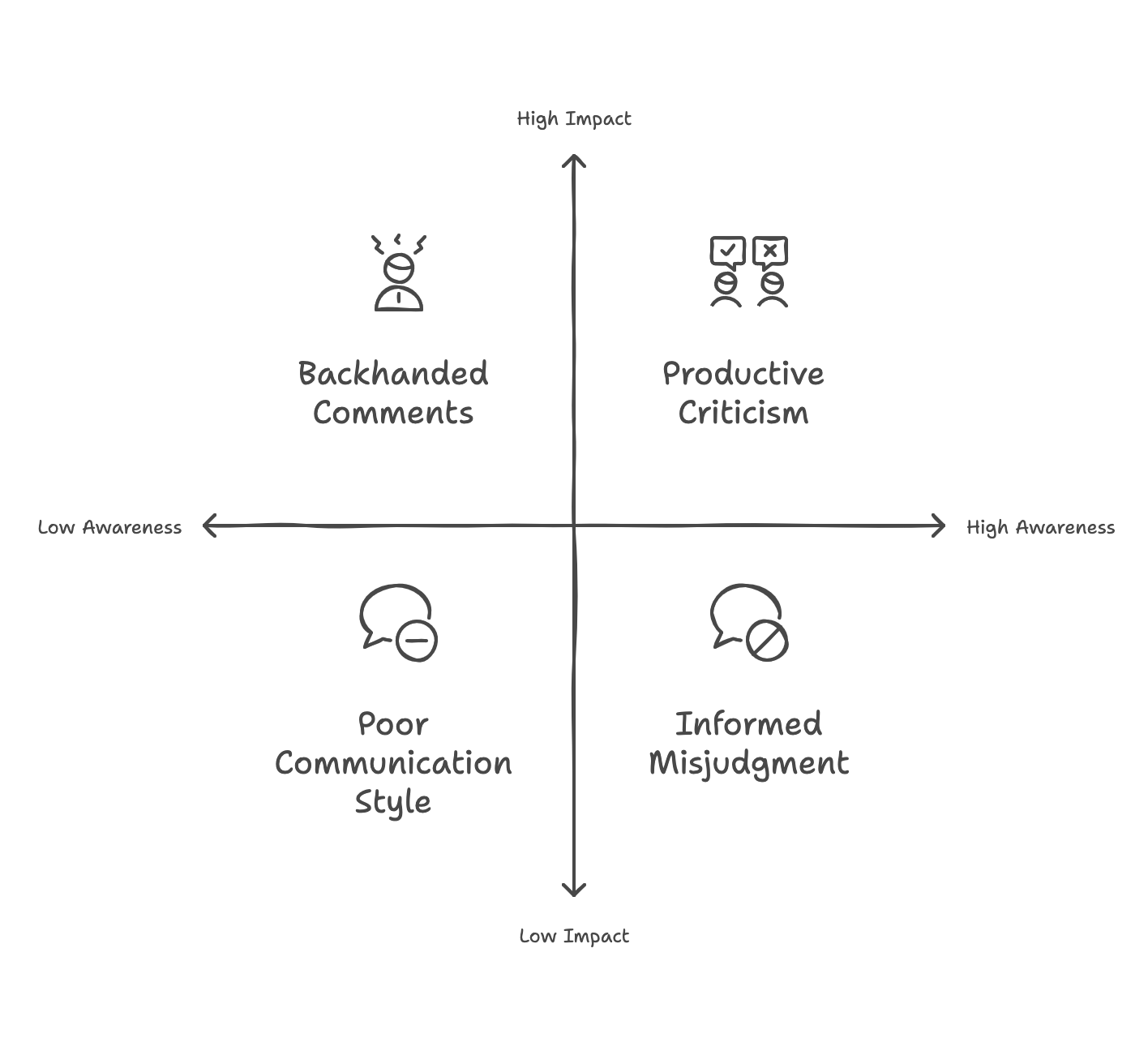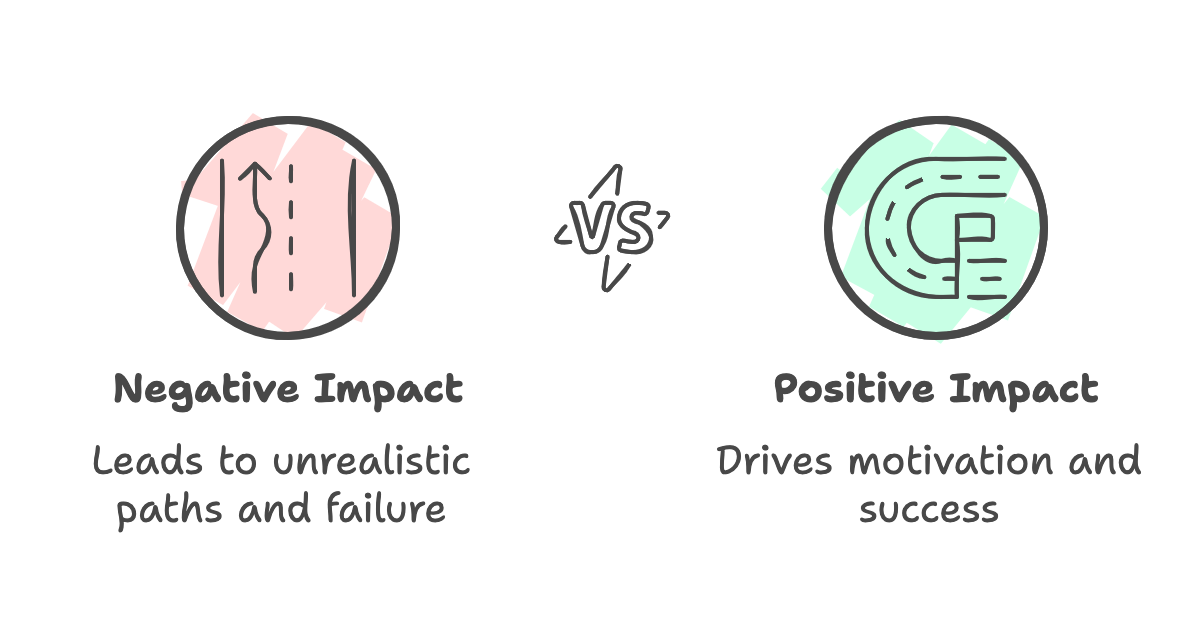Rising above the Naysayers
“We would need a whole fleet of engineers to get close to that result!” Gerome snapped, incredulity etched across his face. I smiled and nodded, the familiar weight of self-doubt settling in my chest. I didn’t have the guts to push back. In reality, I was afraid he was right. What echoed in my mind was far worse than his actual words: “You will never show any significant result to make this project have any sense whatsoever”. In the past, unsure how to digest this bitter bite, I would have sheepishly walked back to my corner, staring at a screen that was laughing back at me, also in disbelief. Not this time.
This was one of the many experiences I witnessed in my life. Looking back, I’ve come to recognize that these attacks were never personal. The perpetrators would commonly fall into three categories, each demanding a different response.
The Three Faces of Negativity
While this categorization might appear reductive, I’ve witnessed these patterns with such consistency that they deserve a better look.

1. The Backhanded Comments: Veiled Daggers
I’m always surprised by people's lack of awareness of how their words can affect others. Regardless of intention, they can either build someone up or tear them down. I’ve often seen these remarks as a defense mechanism or a way to dismiss someone’s work.
Neither is good. They reveal broken team dynamics. After all, who would dismiss a colleague’s work so easily, unless it threatened their work or sense of self-worth?
How do you react?
As someone who’s not a fan of gratuitous criticism, I immediately go deeper. I want to learn more about the comments made.
- What’s the basis for it?
- Where is this coming from?
- Do they have a better idea in mind?
- If it’s a concern, how can we mitigate it?
This comes from a genuine curiosity: Why do they feel like their comment should be made in passing? How do I transform a backhanded comment into productive criticism?
How do you avoid making this mistake?
Give yourself a chance to think before expressing a quick judgment. Avoid making wild predictions without information to back them up. This has the chance to damage a relationship you care about.
2. The Uninformed Critic: Speaking Without Knowledge
This can be an honest misjudgment, but not one we should overlook. I’ve noticed these comments from people who don’t want to be left out of the conversation. They sometimes believe a zinger can draw more attention and make them sound more intelligent. That’s a risky way to do it, not one I’d recommend. How do you react?
Lead with Kindness and curiosity. Assume the best and follow-up with questions to quickly dismantle the misinformation.
- What makes you think so?
- How can we work around that?
- Have you considered X (where X covers the context they might be missing)?
How do you avoid making this mistake?
Ask clarifying questions! I have found that some of the most competent and effective leaders leave nothing to be guessed. They ask questions that other people in the room might consider obvious. Doing so, they help everyone fill knowledge gaps, ensuring the whole crowd has the same level of understanding.
3. The Poor Communicator: Right Message, Wrong Delivery
This has been close to my heart for a long time. I have learned to give these individuals the benefit of the doubt, which often leads down divergent paths.
Sometimes, they’re genuinely too abrasive. No matter how you twist it, their actions reflect the way they communicate. That’s when I prefer to part ways.
Other times, they have good intentions but can’t express them correctly. In the latter case, I have built powerful relationships by simply taking time to understand their communication style.
How do you react?
Similarly to my previous article, separate information from delivery.
- Is it an objectively fair assessment?
- If it were someone else you trust saying it, would you consider that insight differently?
- Do their actions contradict their words? (i.e. are they generally good individuals to work with compared to how they deliver information?)
How do you avoid making this mistake?
Learn how to read the room and people’s reactions. That can be the first sign of you expressing a comment poorly. If you care about the relationship, don’t be afraid to ask follow-up questions and acknowledge that you have clumsily expressed your opinion.
I’m aware that reading social cues does not come naturally to everyone. If you’re unsure, find the courage to ask other participants for feedback. Reflect on it so you can improve your communication further.
What Research Reveals About Our Reactions
I wasn’t surprised to see evidence of what causes your reaction to naysayers and nemeses. Edward L. Deci and Richard M. Ryan's self-determination theory provides a straightforward and compelling explanation.
We all commonly need to feel competent and effective in our field. This is a driver for our motivation and growth. When faced with naysayers' and nemeses’ criticism, our sense of competence becomes threatened. If we feed into that knee-jerk reaction, we fall into the trap of exacerbating the relationship by taking a strong stance or response just to oppose the other party.
This is unhealthy and can lead to a lose-lose scenario. The rapport is now prickly, and that interaction can lead to the poorest outcome. It is now based on emotion, not fairness. I find myself circling back to Shane Parrish’s “Clear Thinking” book. In multiple instances, he calls out how emotional reactions (“defaults”) hinder clear thinking and better results.
These experiences can be discouraging, training the impostor syndrome to grow stronger. But it doesn’t have to end there.
From Negativity to Vigorous Motivation
I’ve found that skepticism of my abilities often affects me the same way. The default reaction is an emotional one, trying to protect my sense of self-worth from the opposing view. Once I overcome the initial self-doubt, I’m able to rationalize the rival’s challenge (or at least that’s what it looks like to me).

Seeing the naysayer as a nemesis is superpowered by the will to prove them wrong. Beware though! This is both good and bad. If it leads you down an unrealistic path that swerves you away from more significant outcomes, then you should stop and rationalize the cause-and-effect chain. On the other hand, you can drive that emotion to stay motivated in pursuing an important personal goal. Always asses what’s at the other end.
If you’re being challenged to jump over a Lion’s den because someone is second-guessing your courage, you should let that go. In this case, winning over the naysayer gives you nothing (but provides a nice meal for the Lion). Opposite to that, if you’re facing doubts in realizing your ambitious plan of becoming a pro athlete, you might just need to roll up your sleeves and prove them wrong.
Conclusion
When facing naysayers, harnessing disruptive emotions can propel you forward. Rivalry, properly framed, can be a motivator to help you focus on your goal. It’s not all dandy, though. It takes mental strength and willpower to re-frame any of the three interactions as a test rather than a final assessment of your worth.
What matters most isn't eliminating criticism but developing a harder shell. Learn to pause and discern underlying value from gut reaction. The strongest leaders aren't those who avoid criticism but those who've learned to mine it for the precious insights.
Does any of this resonate with your experience? What other strategies have you used to soar above the rivalry?